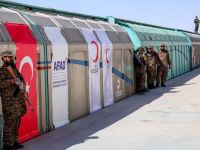Prime Minister Mikhail Kasyanov reported an optimistic economic forecast for 2000 on Tuesday that included a 10-percent jump in industrial production and seven-percent growth in GDP.
Meanwhile the ruble fell to 27.95 to the dollar from 27.91 late on Monday and to 24.79 to the euro from 24.53
The growth figures, if they come true, could deliver an important boost to Kasyanov's government, which is under pressure, and show that the economy had its best year since collapse of the Soviet Union in 1991.
Kasyanov told an Western investment forum in Moscow that annual inflation for 2000 would hold at 21 percent compared to 84 percent the previous year.
His government is aiming for 12-14 percent inflation next year and reported a 10-percent growth in the population's real income for the current year.
"The Russian government's main task is to build on these positive economic tendencies," Kasyanov said.
He also set out two key short-term tasks for his government: making Russia's struggling banking sector more transparent and reforming the so-called natural monopolies such as the electricity and natural gas sectors.
"Our goal is to make these industries competitive and transparent," Kasyanov told the Western investors.
However his optimism came against the backdrop of intensifying criticism of the government's work by President Vladimir Putin and his senior economic aides.
Putin over the weekend savaged a foreign debt restructuring plan negotiated by Kasyanov earlier this year as counterproductive for Russia and accused the government of relying too much on barter trade.
Meanwhile Putin's most senior economic advisor bluntly accused Kasyanov of wasting the year away even while the country profited from skyrocketing world prices on its oil and natural gas exports.
"Without any effort, without changing anything, 30 billion dollars (33.70 billion euros) extra has come into the Russian economy," Andrei Illarionov said. "The question was how to use that money."
Illarionov said economic indicators pointed to a slowdown in Russia growth over the past few months.
Russia currently owes 48 billion dollars to sovereign creditors in the Club of Paris and has not budget for any of the 3.3 billion dollars that come due next year in the 2001 spending plan.
Economic Development and Trade Minister German Gref said on Tuesday that Russia would honor its debts in 2001 even if it failed to restructure them in time.
"We will honor all of our debts even if we fail to reach an agreement," Interfax quoted Gref as saying.
About 39 percent of Moscow's sovereign debt is owed to Germany and the two countries are currently negotiating as debt write-off in exchange for shares in some Russian companies.
However economists predict that plan would have a hard time getting past Russia's State Duma lower house of parliament -- MOSCOW (AFP)
© 2000 Al Bawaba (www.albawaba.com)







